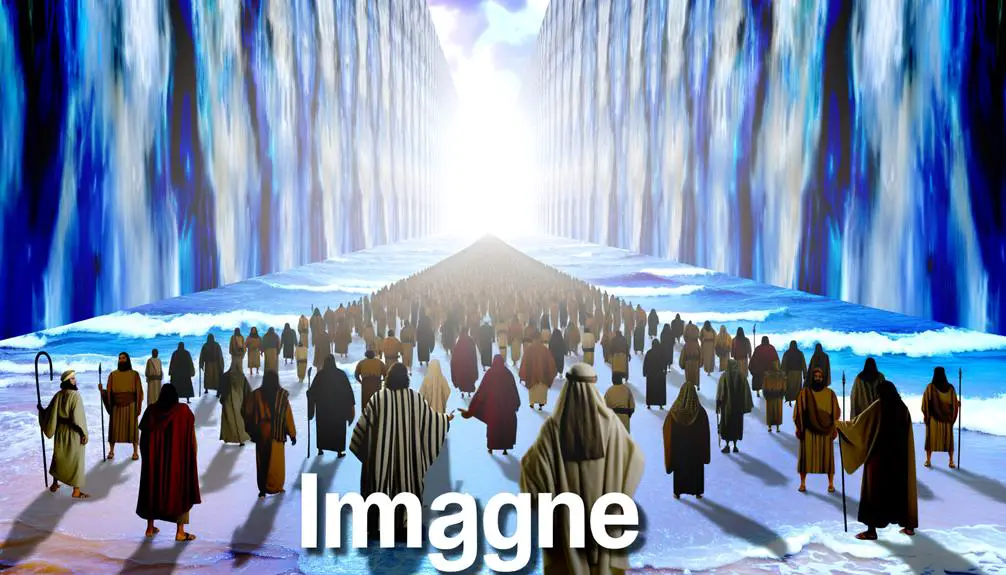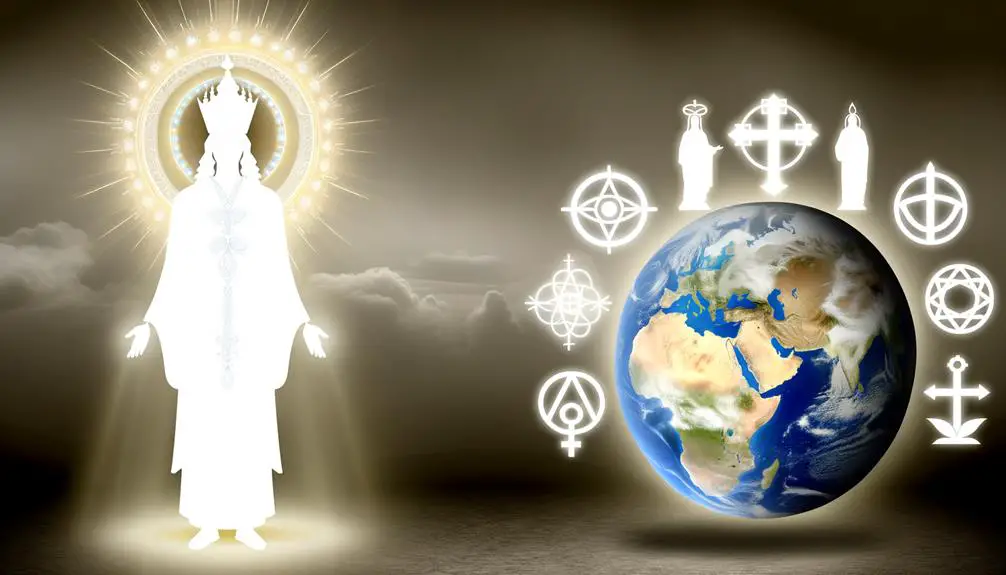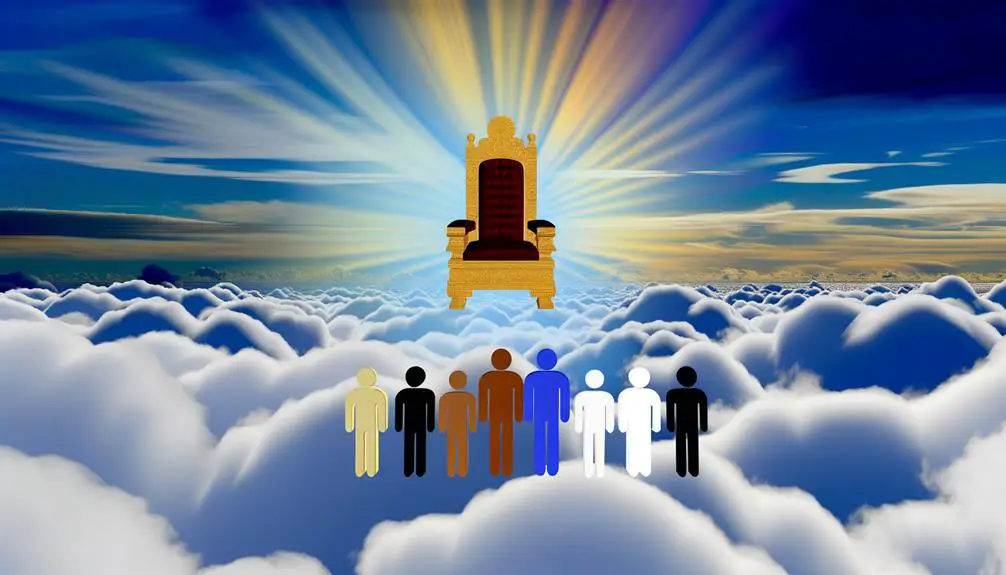Biblical supremacy unveils God's unrivaled authority, inviting readers to explore its profound impact on faith and life—discover how.

Define Supremacy in the Bible
In the broad biblical narrative, supremacy signifies a sacred sovereignty, a divine dominance that defines the fabric of faith. You'll uncover that the scripture scaffolds this concept from Genesis to Revelation, showcasing God's unrivaled reign over creation, covenants, and kingdoms.
As you explore the layers of scriptural evidence, you'll realize how this supremacy isn't just about power but about purpose, promise, and providence. The journey through biblical texts reveals not only the nature of God's authority but also its impact on humanity's past, present, and prophesied future.
Wondering how this ancient authority applies to modern life? Let's peel back the layers together.
Key Takeaways
- Supremacy in the Bible signifies God's unparalleled sovereignty, wisdom, and power over all creation.
- Biblical narratives, such as the Exodus and Jesus' life, demonstrate God's supreme authority through miraculous interventions.
- The scriptures challenge human authority, advocating a hierarchy that places divine commands above earthly desires and practices.
- Divine supremacy encompasses not only omnipotence but also embodies ultimate love, justice, and moral goodness.
The Nature of Divine Supremacy
In exploring the nature of divine supremacy within the biblical context, it's crucial to understand how this concept underscores the unparalleled authority and sovereignty of God over all creation. This supremacy isn't merely about power but also encompasses wisdom, justice, and love. The omnipotence debate centers on God's ability to enact His will without limitation, a hallmark of divine supremacy. You'll find that scholars deeply engage with this topic, often pondering the extent of God's power and how it interacts with human freedom and responsibility.
The moral implications of divine supremacy are profound and multifaceted. They challenge you to consider how absolute power coexists with the principles of goodness and justice that are attributed to God. This aspect of the debate asks you to reconcile the existence of evil and suffering in the world with the concept of a supremely good and powerful deity. It's a critical inquiry that delves into the character of God as described in biblical texts, asking whether divine actions and commands reflect moral perfection.
Analyzing divine supremacy requires a nuanced understanding of these debates. It's essential to approach them with an open mind and a willingness to explore complex theological concepts. The omnipotence debate and the moral implications of divine supremacy push you to think deeply about the nature of God's relationship with the world and its inhabitants. Through this exploration, you're invited to engage with fundamental questions about power, morality, and the essence of divine authority as portrayed in the Bible.
Scriptural Foundations of Supremacy

How does the Bible lay the groundwork for understanding divine supremacy? At its core, the Bible presents a framework that elevates the divine above all, subtly weaving this principle through narratives, laws, and prophetic writings. This foundation is critical for interpreting the complex relationship between divine will and human authority, a theme that recurs throughout the scriptures.
In the Old Testament, the laws given to Moses underscore a system where divine commands supersede human desires and societal norms, establishing a clear hierarchy where God's authority is paramount. This isn't merely about obedience; it's about recognizing a fundamental order in the universe. The prophets, too, speak to this hierarchy, often challenging kings and leaders who fail to acknowledge divine supremacy, thereby critiquing the human authority structures of their time.
The New Testament continues this theme, with Jesus' teachings and actions frequently contrasting divine principles with earthly practices. Here, the tension between divine supremacy and human authority comes to the fore, especially in narratives where Jesus confronts the religious and political leaders of his day. These interactions aren't just historical accounts; they serve as a lens through which to view cultural interpretations of authority and power.
Understanding divine supremacy in the Bible, then, requires an appreciation of how these scriptures challenge and redefine human authority. It's a dynamic interplay that has shaped, and continues to shape, cultural interpretations of power, leadership, and governance. This foundation compels readers to consider not just the nature of divine supremacy but its implications for human societies and the structures that govern them.
God's Sovereignty in Creation

You'll find that the Bible asserts God's absolute authority in the creation narrative, emphasizing Creation's Divine Origin and Sovereignty Over Nature.
This framework posits that every aspect of the natural world is meticulously orchestrated by a supreme being, challenging you to reconsider notions of randomness or chaos in the universe.
Analyzing these points allows for a deeper understanding of the theological implications of God's unchallenged dominion as depicted in biblical texts.
Creation's Divine Origin
The biblical narrative posits that the universe's creation is a direct manifestation of God's sovereign will, underscoring His absolute authority over all existence. This view posits a cosmos crafted with intention, purpose, and cosmic harmony, a stark contrast to the randomness suggested by some interpretations of the evolutionary debate.
Within this framework, every star, planet, and living creature emerges not from chance but from divine decree, reflecting a universe inherently ordered and governed by a supreme being. This perspective doesn't merely contribute to theological discourse but also offers a foundational lens through which the origins of life and the universe are understood.
It asserts that behind the complexities and mysteries of the cosmos lies an omnipotent will, orchestrating creation's vast expanse with precision and purpose.
Sovereignty Over Nature
In exploring God's sovereignty in creation, it becomes evident that this divine authority extends to an intricate governance over nature, illustrating a meticulous design rather than a series of fortuitous events. This control is not only about power but also about the balance and harmony within the natural world, including miracle occurrences that defy natural laws, pointing to a supreme being at work.
Aspect |
Description |
Implication |
|---|---|---|
Miracle Occurrences |
Events that defy natural laws |
Evidence of divine intervention |
Natural Order |
Regular, predictable patterns |
Reflects meticulous design |
Human Stewardship |
Responsibility towards creation |
Calls for respect and preservation |
Environmental Balance |
Harmony among ecosystems |
Indicates intentional design |
Understanding God's sovereignty over nature prompts a reflection on human stewardship, urging a responsible and respectful interaction with the world.
The Exodus: Demonstrating God's Power

You'll observe that the Exodus narrative showcases God's supremacy through strategic interventions, notably the plagues that challenge Pharaoh's authority and the miraculous Red Sea crossing. These events not only validate divine power but also serve as a pivotal demonstration of God's commitment to liberating His people.
This analysis aims to explore the implications of these acts within the broader context of divine supremacy as depicted in biblical literature.
Plagues Challenge Pharaoh
Analyzing the Exodus narrative, one observes that the plagues sent upon Egypt not only challenged Pharaoh's authority but also demonstrated God's supreme power and will to liberate the Israelites. Here are key aspects to consider:
- Economic Impacts: Each plague systematically dismantled Egypt's economy, from decimating crops to annihilating livestock, highlighting divine control over prosperity and survival.
- Cultural Symbolism: The plagues targeted the Egyptians' deities, directly contesting the polytheistic beliefs and asserting monotheism's superiority.
- Societal Disruption: The widespread chaos sowed doubt among Egyptians regarding Pharaoh's divinity and leadership.
- Divine Supremacy: The plagues served as tangible demonstrations of God's power, unequivocally proving His supremacy over Pharaoh and the Egyptian gods.
Red Sea Crossing
Following the plagues, the Red Sea crossing stands as a pivotal demonstration of God's unparalleled power, further cementing His supremacy in the face of Egyptian opposition.
Archaeological evidence and historical accuracy of this event have been subjects of intense scholarly debate. While direct archaeological proof remains elusive, certain findings suggest a plausible route and context for the Exodus narrative.
You must consider the interdisciplinary approach combining ancient texts, geological studies, and archaeological discoveries that aim to provide a holistic understanding of the event. This analytical journey underscores the complexity of validating biblical narratives through physical evidence.
Still, it also highlights the Red Sea crossing as a foundational story demonstrating God's dominion and intervention in human history, reinforcing the theme of supremacy throughout the biblical narrative.
Jesus Christ: Supremacy Incarnate

In Christian theology, Jesus Christ is considered the epitome of divine supremacy, embodying God's sovereignty in human form. This concept isn't merely about authority or power; it's deeply intertwined with Christ's humility and transformative redemption. Through His life, teachings, death, and resurrection, Jesus exemplifies supremacy not as dominion over others but as ultimate servitude and sacrifice for humanity's sake.
To understand this nuanced concept of supremacy as it relates to Jesus Christ, consider the following:
- Christ's Humility: Contrary to earthly kings, Jesus chose a path of humility, being born in a manger and living a life of service. This humility is a cornerstone of His supremacy, showcasing that true power lies in selfless love and service to others.
- Transformative Redemption: Jesus' death and resurrection are central to Christian belief, embodying the ultimate act of love and redemption. This transformative act demonstrates His supremacy over sin and death, offering salvation to all who believe.
- Teachings of Love and Service: Jesus' teachings emphasized love, compassion, and service above all. Through parables and actions, He illustrated the supremacy of God's kingdom values over worldly pursuits.
- Miracles as Signs of Divine Authority: The miracles performed by Jesus weren't just acts of compassion but also demonstrations of divine authority, affirming His identity as the Son of God and His supremacy in the spiritual and physical realms.
Analyzing Jesus Christ's role as supremacy incarnate encourages a deeper reflection on the nature of true power and leadership. It challenges believers to embody Christ-like humility and love in their lives, reflecting the transformative redemption He offers.
The Role of Supremacy in Prophecy

Delving into biblical prophecy, you'll find supremacy plays a pivotal role in foretelling the establishment and culmination of God's kingdom on Earth. As you explore the scriptures, it becomes evident that the concept of divine supremacy is central to understanding the prophetic narrative woven throughout the Bible. This narrative doesn't merely predict future events but underscores the ultimate authority and dominion of God over all creation.
Within the realm of biblical scholarship, supremacy debates often surface, particularly in the context of prophecy interpretations. These debates scrutinize the extent of God's supremacy as portrayed in prophetic texts, analyzing how this supremacy is expected to manifest in the physical and spiritual realms. Scholars delve into passages from books like Daniel, Isaiah, and Revelation, seeking to unravel the complex imagery and symbolism that often characterizes biblical prophecy.
The interpretive process is rigorous, requiring a careful examination of historical, cultural, and theological contexts. This scholarly endeavor aims to piece together a coherent understanding of how God's supremacy is revealed through prophecy. Such interpretations aren't uniform; indeed, they vary widely among theologians and biblical scholars, reflecting the depth and diversity of thought within Christian theology.
Understanding the role of supremacy in prophecy is crucial for grasping the overarching biblical message of hope and redemption. It illuminates the ways in which God's ultimate authority is both a present reality and a future promise, offering insight into the divine plan for creation's restoration and the establishment of eternal justice and peace.
Living Under Divine Authority

Understanding the supremacy of God in prophecy sets the stage for exploring how believers live under divine authority. This concept isn't merely theoretical; it deeply influences daily life and decision-making processes. Living under divine authority involves recognizing the intersection of human agency with spiritual discipline. It's a dynamic relationship that calls for an active, conscious commitment to align one's actions and choices with divine will.
Here are four key aspects of living under divine authority:
- Recognition of Sovereignty: Acknowledge that God's supremacy extends beyond prophecy into the governance of the universe and individual lives. This acknowledgment shapes how you perceive challenges and opportunities, seeing them as part of a divine plan rather than random occurrences.
- Exercise of Human Agency: Despite the omnipotence of divine authority, human agency isn't negated. You're encouraged to make choices and take actions, but with the wisdom and guidance that spiritual discipline provides. This balance ensures that your free will aligns with divine intentions.
- Commitment to Spiritual Discipline: Spiritual disciplines such as prayer, meditation, and study of sacred texts are non-negotiable aspects of living under divine authority. These practices foster a deeper understanding of divine will and how to apply it in everyday situations.
- Navigational Aid in Moral Decision-Making: Divine authority serves as a compass in moral and ethical dilemmas. By submitting to this higher authority, you're equipped with a framework for making decisions that reflect not just personal or societal norms, but a higher moral standard.
Living under divine authority, therefore, is a holistic approach that integrates human agency with spiritual discipline, guiding believers in their journey through life.
Frequently Asked Questions
How Have Interpretations of Divine Supremacy Influenced Modern Legal Systems and Governance?
Interpreting divine supremacy has deeply influenced modern legal systems and governance. Integrating principles that align with global secularism and legal pluralism has fostered a framework where laws reflect a blend of moral directives rooted in religious teachings and the demands of a pluralistic society.
This fusion has been crucial in shaping legal norms and governance structures, ensuring they're adaptable to the evolving ethical and societal landscapes.
In What Ways Has the Concept of Supremacy in the Bible Been Misused or Misinterpreted Throughout History for Political or Personal Gain?
Throughout history, the concept of supremacy has been twisted for political or personal gain, notably during the Historical Crusades and instances of Cultural Imperialism.
You've seen how leaders harnessed biblical supremacy to justify conquests and enforce dominance, often deviating from original teachings.
This misuse underlines a complex interplay between religion and power, where the sacred text's intended message of unity and love was overshadowed by ambitions of control and expansion.
How Do Different Religious Traditions Outside of Christianity Interpret the Concept of Supremacy in Their Holy Texts?
You're exploring how various religious traditions interpret the concept of supremacy in their sacred texts.
From an Islamic perspective, supremacy often ties to God's ultimate power and authority, contrasting with any human or political dominance.
Hindu interpretation, meanwhile, can reflect a more philosophical stance, emphasizing dharma (duty/righteousness) and the cosmic order, rather than supremacy in a hierarchical sense.
These views diverge significantly from each other and from Christian interpretations of supremacy.
Can the Idea of Divine Supremacy in the Bible Be Reconciled With Contemporary Views on Equality and Human Rights?
You might find reconciling the idea of divine supremacy with contemporary views on equality and human rights challenging. It presents an equality paradox, where divine authority might seem at odds with human equality.
However, through a rights reinterpretation, one can argue that biblical teachings, when analyzed deeply, promote a fundamental respect for human dignity that aligns with modern human rights. This requires a nuanced understanding and application of biblical principles.
How Does the Notion of Supremacy in the Bible Influence Interfaith Dialogue and Relationships Between Different Religious Communities?
You're walking a tightrope when discussing how biblical supremacy impacts interfaith dialogue. It's a balancing act requiring cultural sensitivity and a commitment to interfaith education.
Analyzing this influence, it becomes clear that understanding and respecting each religion's perspective on supremacy can either bridge or widen gaps between different faith communities.
This approach doesn't just foster healthier conversations but also paves the way for more cohesive and respectful interreligious relationships.
Conclusion
In conclusion, you've ventured through the cosmic tapestry of divine supremacy, where God's sovereignty eclipses the vast expanse of creation like an unstoppable celestial force.
From the riveting exodus saga to the living embodiment of supremacy in Jesus Christ, the biblical narrative is a masterclass in divine authority.
As you stand under this towering canopy of spiritual dominion, remember, living under divine authority isn't just a pathway; it's a grand odyssey across the boundless realms of prophecy and power.



Sign up